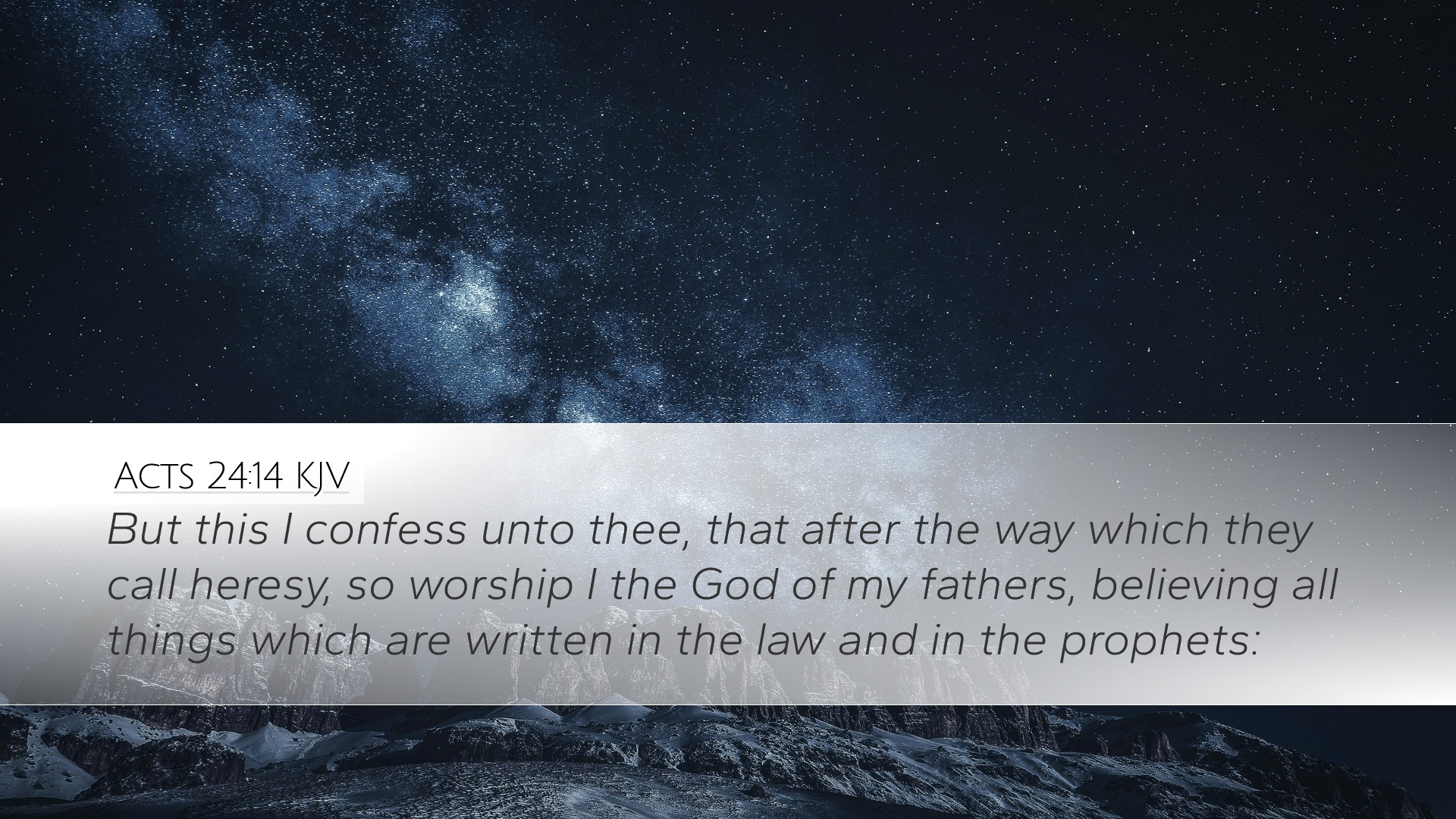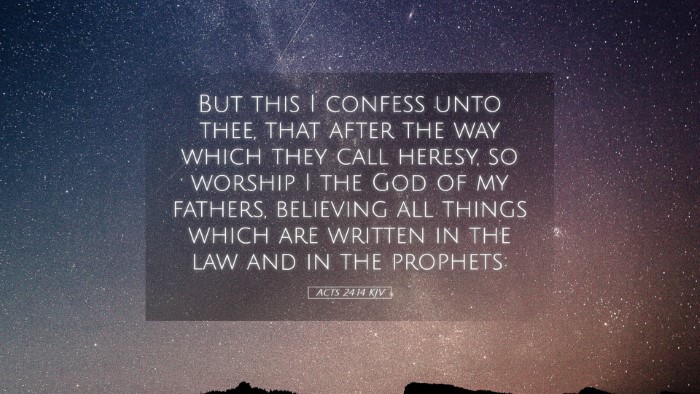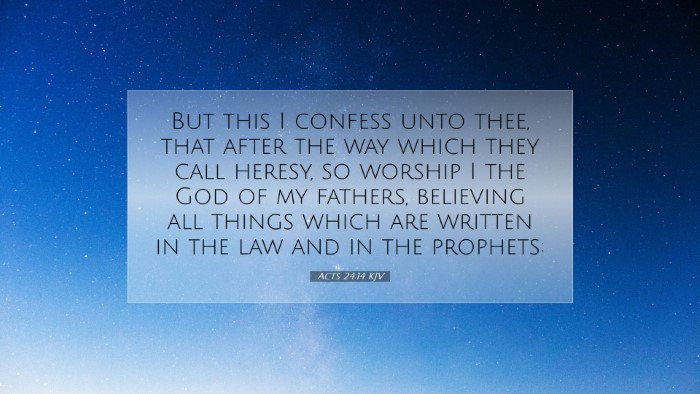Old Testament
Genesis Exodus Leviticus Numbers Deuteronomy Joshua Judges Ruth 1 Samuel 2 Samuel 1 Kings 2 Kings 1 Chronicles 2 Chronicles Ezra Nehemiah Esther Job Psalms Proverbs Ecclesiastes Song of Solomon Isaiah Jeremiah Lamentations Ezekiel Daniel Hosea Joel Amos Obadiah Jonah Micah Nahum Habakkuk Zephaniah Haggai Zechariah MalachiActs 24:14
Acts 24:14 KJV
But this I confess unto thee, that after the way which they call heresy, so worship I the God of my fathers, believing all things which are written in the law and in the prophets:
Acts 24:14 Bible Commentary
Commentary on Acts 24:14
Acts 24:14 states, "But this I confess to you, that according to the way which they call a sect, so I worship the God of my fathers, believing all things which are written in the Law and in the Prophets." This verse provides profound insight into the faith of the Apostle Paul and his defense before Felix. In this analysis, we will explore the theological implications of this verse, drawing from the insights of public domain commentators such as Matthew Henry, Albert Barnes, and Adam Clarke.
Contextual Background
The Apostle Paul stands before the Roman governor Felix, accused by the Jewish leaders of being a troublemaker and a promoter of heresy. In Acts 24, Paul has the opportunity to defend his beliefs and mission. This situation sets the stage for understanding the fervor with which Paul adheres to the tenets of his faith.
Theological Themes
-
The Concept of 'The Way'
Paul refers to Christian belief as “the Way,” symbolizing a genuine movement rather than a mere religion. This term is essential as it denotes both a lifestyle and a relational path with God, consistent with the teachings of Christ. Matthew Henry emphasizes that Paul's use of "sect" indicates a terminological struggle within the Jewish community, where followers of Jesus were seen as a deviation from traditional Judaism.
-
Worship of the God of His Fathers
Paul's declaration that he worships "the God of my fathers" emphasizes continuity with the Jewish faith. Albert Barnes notes that this is a potent assertion, underscoring that Paul does not reject his heritage but rather fulfills it through Christ. His statement serves to align his Christian beliefs with the Jewish faith, countering the accusations of innovation.
-
Belief in the Scriptures
Paul’s assertion of believing “all things which are written in the Law and in the Prophets” highlights the importance of Scripture in his defense. Adam Clarke points out that this encompasses the entirety of Hebrew Scriptures which Paul feels inspired to uphold. This connection to the Law and the Prophets reinforces the idea that Christianity is deeply rooted in Jewish revelation.
Insights from Matthew Henry
Matthew Henry suggests that Paul’s defense is commendable since he employs logical reasoning grounded in faith. Henry elucidates that the faithful believer will be assailed with opposition, much like Paul was, but through steadfastness and sound doctrine, one can maintain authenticity. Paul’s acknowledgment of his beliefs as consistent with historical Judaism reflects the continuity and fulfillment of the revelations contained within the Scriptures.
Insights from Albert Barnes
Albert Barnes points out the strategic manner in which Paul presents his beliefs to Felix. Barnes notes that while accused of being a zealot for a new sect, Paul clarifies that his faith is an extension of the very Scriptures revered by his accusers. He emphasizes that true followers of God will reflect on past prophecies and their fulfillment in Christ. This appeals to the Jewish audience while demonstrating a commitment to truth and accountability.
Insights from Adam Clarke
Adam Clarke highlights the implications of Paul’s position regarding circumcision and the Law. He notes that Paul identifies with the historic faith while simultaneously presenting the message of transformation and grace brought forth through Jesus. Clarke asserts this was crucial in establishing that the Christian faith is not a repudiation of Judaism but rather its ultimate completion. Paul’s approach functions as a framework for dialogue between differing faith expressions.
Practical Application
For pastors and theologians today, Acts 24:14 serves as a mirror reflecting the need for clarity in teaching and defending the faith. Believers are called to engage thoughtfully with both Scripture and cultural contexts. This verse encourages modern Christians to:
- Embrace Heritage: Recognize the continuity of faith and the importance of aligning beliefs with Scriptural teaching.
- Be Ready to Defend: Equip themselves to articulate their faith, especially in environments hostile to Christianity.
- Engage with Faith Communities: Foster dialogue with those of differing beliefs, emphasizing the fulfillment of the Law in Christ.
Conclusion
Acts 24:14 presents a profound revelation about the Apostle Paul’s faith and the way he articulates his beliefs in the face of opposition. Drawing from the wisdom of Matthew Henry, Albert Barnes, and Adam Clarke, we understand that Paul’s testimony encapsulates key elements of Christian identity rooted in Jewish faith. As scholars, pastors, and students of the Word, we learn from Paul’s example of courage, clarity, and continuity in faith, challenges that remain relevant in our contemporary context.


